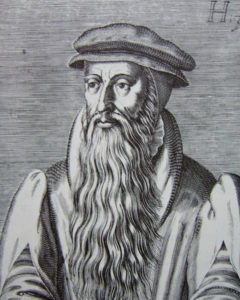William Tyndale and His Calling to Translate the Word of God
“In the beginning was the Word, and the Word was with God, and the Word was God.” – John 1:1
How did an inexperienced clergyman without peerage or fortune, become one of the most important and influential people in all of Tudor England? Graduating from Oxford and Cambridge, young William Tyndale was the chaplain of Sir John Walsh and worked as a tutor for Sir Walsh’s children. While his occupation may have been humble, Tyndale made his opinions so well known that a year after he began working as a chaplain, he was brought before the Chancellor of the Diocese of Worchester. The extreme devotion the clergy rendered the Pope struck a discordant note with Tyndale, who believed that Christ was the true source of Christian authority.
In 1523 Tyndale departed for London to request permission to translate the Bible into English. Having been refused, Tyndale proceed to spend his time teaching and studying in London but he did not stay for long. By 1524 Tyndale had left England and began translating the New Testament into English, without permission from the Catholic authorities. Within a year Tyndale had finished his translation and copies of his work were being printed and circulated all over Europe. When Tyndale’s translation reached England it was condemned by Bishop Tunstall, who ordered the book to be burned in public.
Tyndale continued translating, working on his Old Testament as well as various treatises. His opposition to the marriage annulment of Henry VIII made Tyndale the target of the king’s anger. William Tyndale was arrested and charged with heresy 1536 and sentenced to be be burned to death. His final words were, “Lord! Open the King of England’s eye.” Four years later the King ordered official English translations of the Bible and the Christian world changed forever.

